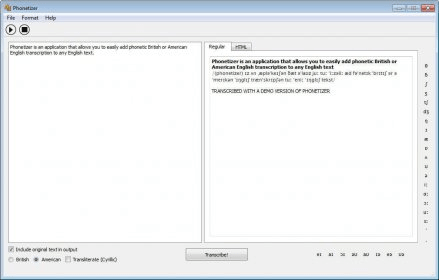

- ENGLISH PHONETIZER HOW TO
- ENGLISH PHONETIZER FULL
- ENGLISH PHONETIZER CODE
- ENGLISH PHONETIZER TRIAL
- ENGLISH PHONETIZER FREE
show the translation in the translation window.convert the translated text into speech.translate text into the chosen language.automatically detect the language of the text if the language detection was not correct, manually choose the language of the source text from the Translate drop-down box.press the Translate & Speak button ImTranslator will:.enter text or copy and paste text into the text window.choose the target language for translation.make sure that the Translate check mark box is ON.
ENGLISH PHONETIZER HOW TO
ENGLISH PHONETIZER FREE
To learn more about integrating technology to support English language learners, attend our free Friday webinars. For more ideas on how to use web tools and apps to enhance student listening skills check out our webinar recordings, Teaching with Listening Tools and Apps and Audio Projects for Learners. Below are various websites with audio recordings of music, poetry, news and more accompanied with exercises, games, or transcripts to help your language learners improve their listening skills. Chances are language learners will communicate in English more with non-native speakers versus native speakers since the world has about 400 million native speakers compared to over a billion non-native speakers of English. Language learners need to be able to hear English from various speakers and sources at different speeds. február 05, 2014: Audacity Unconference (AU14) 14 Websites to Improve Listening Skills for Teens and Adults – American TESOL Institute Listening is one of the 4 skills our students rarely get to practice outside of our classrooms. Check our feature list, wiki, and forum for more information.

I chose to exclude homophones, words that sound identical, because as far as I am concerned “air” doesn’t rhyme with “heir” (nor, for that matter, does “air” rhyme with “air”).Ingyenes Audió Szerkesztő és Felvevő Audacity is available for Windows®, Mac®, GNU/Linux® and other operating systems.
ENGLISH PHONETIZER TRIAL
From trial and error this seems most sensible. If it has the last 3 IPA characters the same, it’s a rhyme. My initial bodge was to use the datapasta R package, but it couldn’t handle the IPA characters.
ENGLISH PHONETIZER FULL
Special characters are fiddly, and IPA is almost by definition full of them. I came to this because, as I’ve learnt many times, encoding can be a real pain. This is because phonetizer removed characters, like the comma, but :: translated to () which was perfect as a word separator.Ĭopy the entire text from R, put in phonetizer, then copy the IPA output into Libre Office Writer, then save as a text file with UTF-8 encoding, then read that output back into R. Print as an output in my R console with ‘::’ as a word separator. This gave me the 3,635 words I wanted to find IPA for, which is much more manageable than the 29,874 individual lines or the 211,430 words. Select only the unique words at the end of a lyric line. Through trial and error with phonetizer on a small subset of words this looked like the best bet. Strip words of all non-alphanumeric characters except for apostrophes.
ENGLISH PHONETIZER CODE
I did some real code bodging at this step (for a bodging explanation see this Tom Scott video - yes I am aware I have referenced him twice now). Good for them, I guess.Īs an alternative to an IPA API, I found this site phonetizer which has a user interface for inputting english and outputting IPA. It’s one of the services the big Dictionary companies provide now. It turns out if you want a good API, so you can send an English word and it will return the IPA, you have to spend money. As an aside, I wonder if the reason the Co-Op dropped their slogan “good with food” is because it reads like it should rhyme, but doesn’t.Īha! The international phonetic alphabet (IPA)! It tells you how words sound, which is what we’re after really. My first thought was to try matching the end of words, but then the english language isn’t that straight-forward - we would miss that “time” and “rhyme” don’t rhyme, and incorrectly assert that “food” and “good” do rhyme.


 0 kommentar(er)
0 kommentar(er)
